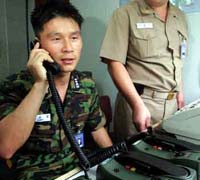
The militaries of the South Korea and the North Korea conducted a trial of a new hotline yesterday that has been set up to help avoid accidental armed clashes along their disputed sea border, the South Korea's Yonhap News Agency reported yesterday.
In the latest round of military working-level talks, the two sides agreed to build a hotline and communication liaison offices in their respective side to prevent accidental armed clashes in the Yellow Sea.
Earlier yesterday, the two sides tested the phone connections by exchanging calls, said Yonhap.
The two liaison offices are to open tomorrow, according to Yonhap.
The two sides will operate the liaison offices 24 hours a day and communication will be made at least twice a day on a regular basis using landline telephones and a facsimile machine.
'Spirit of mutual respect'
UN Secretary-General Kofi Annan on Tuesday praised the "spirit of mutual respect" achieved at the fourth round of the Six-Party Talks on the Korean Peninsula nuclear issue, which went into recess on Sunday in Beijing.
He also found it encouraging that the participants were able to increase understanding and broaden areas of consensus, said a statement delivered by a UN spokesman at the noon press briefing in New York.
"The secretary-general urges the governments concerned to use the time before the round is resumed in three weeks to identify ways to reconcile their needs and concerns," the spokesman said.
Annan also extended special praise to China for "its dedication and tireless efforts to facilitate progress" as the host of the talks.
The United States also spoke highly of the fourth round of the Six-Party Talks and believed that an agreement will be reached.
"We have made important progress in this round of talks. There is agreement among five nations, a consensus that we need a denuclearization of the Korean Peninsula," White House deputy spokesman Trent Duffy said at a briefing on Tuesday.
South Korea to act as mediator
South Korea President Roh Moo-hyun said yesterday that the South Korea should act as a mediator during the recess of the six-party nuclear talks.
At a meeting with Deputy Foreign Minister Song Min-soon, South Korea's chief negotiator to the Six-Party Talks, Roh asked the South Korean delegation to "actively play a role in resolving key differences during the recess," said Roh's spokesman Kim Man-soo.
Roh expressed his appreciation for the efforts of the Seoul delegation, saying "not a small result was achieved despite the fact the talks failed to produce a joint statement due mainly to difference on the peaceful use of nuclear energy," said the spokesman.
(China Daily August 11, 2005)
|

